- Home
- J. T. Edson
Point of Contact
Point of Contact Read online
The Home of Great Western Fiction!
“Even with a psycho there’s a point of contact in the killings,” Sheriff Jack Tragg told Deputies Fayde and Counter as they went to investigate the third apparently unconnected murder in which the same gun had been used. “Find it and at least you’ll have his motive.”
Yet there seemed no point of contact between the victims – and old moonshiner, a visiting theatrical producer and the bust-out man of a crooked floating crap game. So the deputies searched and at last found the point of contact. But finding it gave them the name of another possible victim … Woman Deputy Alice Fayde herself!
ROCKABYE COUNTY 7: POINT OF CONTACT
By J. T. Edson
First Published by Transworld Publishers in 1970
Copyright © 1970, 2018 by J. T. Edson
First Kindle Edition: June 2018
Names, characters and incidents in this book are fictional, and any resemblance to actual events, locales, organizations, or persons living or dead is purely coincidental.
All rights reserved. No part of this book may be reproduced or transmitted in any form or by any means, electronic or mechanical, including photocopying, recording or by any information or storage and retrieval system, without the written permission of the author, except where permitted by law.
This is a Piccadilly Publishing Book
Cover image © 2018 by Tony Masero
Check out Tony’s work here
Series Editor: Ben Bridges
Text © Piccadilly Publishing
Published by Arrangement with the Author’s Agent.
Dedicated by my wife to Sandra Muse, who also had the misfortune to be married to a pike fisherman.
The author would like to express his thanks to Harold A. Serr, Director of the Alcohol and Tobacco Tax Division for his invaluable information on matters concerning ‘moonshining’.
Table of Contents
One
Two
Three
Four
Five
Six
Seven
Eight
Nine
Ten
Eleven
Twelve
Thirteen
Fourteen
Fifteen
Sixteen
Seventeen
Eighteen
Nineteen
About the Author
One
As long as men have distilled spirits and taken pleasure in drinking them, governments have imposed taxes on their production and distribution. Human nature being what it is, there have always been people who objected to paying those taxes. Some of the objectors solved the problem by establishing their own distilleries where the eye of authority could not find them.
Scottish and Irish immigrants brought their knowledge of distilling whiskey to the New World, along with their antipathy in the matter of paying excise taxes. Despite the protests which came from all levels of society, an ever-growing need for revenue, to finance wars or development projects, caused the governing bodies in first the Colonies then the States of the Union to seek the means to raise it. Knowing the public’s disapproval of taxation on private income, the politicians came to regard the distillers and distributors of ardent spirits—luxury items when all was said and done—as a popular and useful source of income. Wherever excise laws came into being, the copper ‘turnip’ stills of the illicit brewers were soon in operation.
With the passing of the years, the increasing demands of governmental spending made the authorities more determined to stamp out tax-evading distilleries. The moonshiner found himself forced to move away from his customers, but continued to produce and distribute his wares. Boats crept silently across the bayous of Florida as they plied between the island-hopper brewers and their salesmen. In the Cumberland Mountains, hardtail-leggers—those mysterious mules which nobody ever owned or trained—trotted unescorted by day or night along narrow, hazardous trails carrying raw materials to, or the finished products from the stills. Horses and human muscles provided other means of transporting the moonshiners’ wares until the coming of the internal combustion engine.
Changing times and conditions did not wipe out the moonshiners, but merely improved their techniques. Instead of working as individuals, they became members of combines operating over counties or even covering whole States; the entire affair, from distilling to delivery being organized like any other business.
Gary Holton worked as a runner for the South-West Texas combine. At the wheel of a souped-up and trapped Ford Mustang, he made collections from moonshiners scattered over the border counties between El Paso and Val Verde. Skilled at his work, whether rolling in a convoy or running alone, he was known as a wiz for the combine but had never been caught and proved to be driving a vehicle transporting non-tax-paid liquor.
Normally a cheerful, happy-go-lucky man, he was ashy pale under his tan as he drove up to the service station just before where State Auto Road 227 entered Gusher City. At nine o’clock on a clear moonlight night, the station was deserted except for an imported M.G. MGB convertible partially hidden in the shadows at the far end of the building. Stopping the Mustang before the petrol pumps, he opened the door. As he was about to climb out, he saw a deputy belonging to the Rockabye County Sheriff’s Office walk from the ‘Women’s’ room. The sight handed him a hell of a shock; although not for the obvious reason.
The deputy had every sexual right to use that particular room. Five foot seven in height, she was bareheaded with red hair done in a medium length, neat flip style. While maybe not as beautiful in a sensual manner as a glamour-movie star, she was sufficiently attractive to meet any but the most demanding tastes and her looks would stand the test of time. Clad in a khaki uniform and calf-high boots, her blouse and slacks set off a figure which was satisfactory without being blatantly eye-catching. Around her waist was a modern basket-stamp Sam Browne belt, without a shoulder strap, supporting a Colt Commander automatic pistol in a forward-raked Safariland No. 55 holster at its right side, balanced by a handcuffs pouch and two cased spare magazines on the left.
Some people might have thought the gunbelt ostentatious, but not Holton. He knew that every peace officer in Rockabye County, regardless of sex, received a thorough training in weapon-handling.
Halting clear of the room’s door, Woman Deputy Alice Fayde looked in Holton’s direction. Instantly he forgot his original intention of calling the combine’s local agent on the telephone. Female officers only carried their firearms openly when on an assignment where they might run into trouble. Which meant Deputy Fayde had a reason for being at the gas station. Maybe a reason connected with the combine. In which case, he had no desire to be held and questioned.
Swinging his feet back into the car, Holton slammed its door. With deft speed, despite his concern, he started the engine and set the Mustang rolling. Making a U-turn, he headed north along the wide, smooth surface of the Auto Road. Even while turning, he felt a surge of relief and it grew as the powerful car picked up speed. In his anxiety, he had made two mistakes.
In all probability, Alice Fayde would not have noticed Holton if he had behaved naturally. Despite his thoughts on the subject, moonshiners were the last thing on her mind as she emerged from the ‘Women’s’ room after relieving the call of nature. Nor was she on a dangerous assignment. Along with her partner, Deputy Bradford Counter, she had been firing the monthly qualification Night Shoot on the Department of Public Safety’s out-of-town ranges; which explained why the Commander rode its holster on her hip instead of being in the more usual Pete Ludwig shoulder bag.
Innocent of intent or not, Alice recognized Holton and read significance in his actions. Experience had taught her many lessons during the career which had begun as a
rookie in the Bureau of Women Officers. After walking a beat in a division of the Gusher City Police Department, she had been promoted to detective, working from station houses in the slum area known as the Bad Bit, then in snob Upton Heights. Time in the various specialist departments came next, Juvenile, Vice and Gambling, Traffic and finally Narcotics. Her work in the latter brought a coveted promotion to the Sheriff’s Office; not as the usual run of woman deputy, riding a switchboard, handling female prisoners or acting as a secretary, but serving as a full-time member of an investigation team. Having county-wide jurisdiction, the Gusher City section of the Sheriff’s Office also served as the city’s homicide squad. Alice could truthfully say that she took a full share of the Office’s workload.
A peace officer, especially one in detection duties, is by nature a hunter and to a hunter flight invites pursuit. Unless Alice was badly mistaken, Holton had a desire to avoid contact with the law. That was sufficient to make her decide on giving chase. So, even as the Mustang purred into movement, she attracted her partner’s attention with an unladylike but effective whistle and waved for him to come.
Even in the driving seat of his M.G. convertible, Deputy Sheriff Bradford Counter conveyed an impression of exceptional size and power. Standing up, he measured six foot three inches, discounting his crepe-soled hunting-boots, and had the muscular development of a Mr. Universe. Topped by curly golden blond hair, his almost classically handsome features would turn female heads in any crowd. Like Alice, he wore a uniform shirt—with his deputy’s badge pinned to the left breast pocket—and slacks. His Sam Browne belt followed hers in general design and fittings, except that it carried a Colt Government Model .45 automatic in a Bianchi Cooper-Combat holster with an Elden Carl safety fly-off strap.
The fact that Brad drove an imported car did not imply he was corrupt, but stemmed from his belonging to one of the richest families in Texas. Unlike Alice and every other member of the Office, he had become a deputy without serving in the G.C.P.D. A Police Science & Administration major from the University of Southern Texas, he had also taken the Federal Bureau of Investigation’s comprehensive police officers’ training course. At first his appointment had aroused hostility or gloomy predictions of failure. Since then, he had proved his worth and gained acceptance. There were few in the county or municipal law enforcement organizations who could equal his skill with firearms. That dexterity may have sprung from being the great-grandson of Mark Counter, old time gunfighter, peace officer—and, if legend could be believed, considerable of a hand with the ladies. [i]
Certainly Alice had never regretted teaming up with Brad, either on or off watch. When working on a case, she found it comforting to remember that her partner could draw and shoot his automatic accurately in around half a second if needed, hold his end up in any kind of rough-house brawl, possessed enormous strength without being slow or clumsy, and was also a shrewd, capable, intelligent peace officer. Nor had she any complaints about him from their off-watch acquaintance. Brad had inherited more than gun-skill from his illustrious great-grandfather.
Attracted by Alice’s whistle and signal, Brad started the M.G.’s engine. He had taken it around the side of the building to check the tires’ air pressure and stayed there to await her return. Noticing the Mustang commencing its U-turn, he sensed the urgency Alice felt to get moving. So he wasted no time in rejoining her. The night being warm, he had left the roof folded down and Alice proceeded to take advantage of it. Before the little car stopped, she vaulted over the door to slide into the passenger’s seat.
‘Get after the Mustang, Brad,’ she ordered, clipping the three-point seat-belt around her.
Taken with her order, Alice’s actions confirmed Brad’s suspicions of why she had called him over. Before she had finished speaking or coupling on the belt, he sent the car lunging from the service station and along the Auto Road. Not until they were speeding after the Mustang did he offer to satisfy his curiosity.
‘What’s up, Alice?’
‘It’s Holton,’ she explained. ‘He’s a whiz for the combine.’
‘Is, huh?’ Brad drawled, increasing the M.G.’s speed. ‘I’ll see if we can run him down, but that’s no hoopy-cat [ii] he’s pushing.’
While obeying Alice’s order without questioning her reasons for giving it, Brad felt puzzled. He knew that moonshining went on in the more remote regions of the county—and, if rumor be true, in some not so remote areas—but it rarely concerned the deputies working out of the Gusher City Office. They had quite enough on their hands dealing with the twenty-two different legal infractions—such as rape, bigamy, kidnapping, even wife-beating—which could be the prelude to murder, to bother with something that came under the jurisdiction of the Alcohol & Tobacco Tax Division of the Internal Revenue Service. Of course if they came upon a whiz, a driver for the combine, running a cargo of non-tax-paid whiskey, or any other kind of law-breaking, they would attend to it.
Settling comfortably in her seat, Alice watched the Mustang gathering speed. She found herself wondering at the motive behind Holton’s actions. For an experienced whiz, he had behaved in a peculiar manner.
‘I wished we’d brought a radio, Brad,’ Alice commented. Then we could call ahead and have a block put on the road. I don’t like it.’
‘Why not?’
‘Why did a wise guy like Holton take off when he saw me? I wouldn’t have given him a second glance but for that.’
‘Could be he’s not tripping at all,’ Brad pointed out. ‘He’s not carrying a rider.’
Alice knew that a transporter car often carried a ‘rider’ to speed the unloading and check on the quantities delivered by the whiz. Yet the lack of the rider proved nothing. Nor did it explain Holton’s reaction to the sight of her leaving the ‘Women’s’ room.
‘I still don’t like it,’ she insisted.
‘Maybe he was doing a burnt run,’ Brad suggested. ‘When he saw you, he figured we’d been tipped there’s a convoy due. So he made sure you noticed him and would give chase. Now he’s leading us away from them.’
It had long been the method of moonshiner combines to send a car on a ‘burnt run’ without a load, to scout the route before the transporter convoy used it. Drawing the officer’s attention to him and inducing them to chase him was an old dry-runner’s decoy trick.
‘That’s possible,’ Alice admitted. ‘In fact, the way he took off, I’d say he expected a posse to be out tonight.’
‘Is there one?’
‘Not that I’ve heard, and there’s nothing happens without the B.W.O. getting to know about it.’
‘Nothing, boss lady?’ Brad asked, sounding a mite concerned.
‘I mean in watch hours,’ Alice reassured him. ‘The bomber boys [iii] usually ask the Sheriff’s Office for help if they hear a convoy’s coming through and I haven’t heard of them asking.’
‘Anyways,’ Brad drawled, easing his car by an articulated truck and into the fast lane, ‘if there’s a posse out, chasing the Mustang may help them.’
‘Yes,’ Alice agreed. ‘With us after Holton, they may send the convoy off thinking he’s decoyed the posse away. I still wish we’d brought a radio.’
‘I’d settle for a siren,’ Brad growled, watching the road ahead. ‘That way we’d get a clear run after him, they’d know we’re the law. Are there any badge-bandits along here?’
‘Badge-bandits yet!’ Alice sniffed. ‘You’ve been with the hot-rod set again. There’s usually one behind the Tri-State Removals’ billboard about a mile on. Are you scared he’ll hand you a speeding ticket? ’
‘Nope, I’m a friend of the mayor,’ Brad replied, then became serious. ‘If he’s there, he’ll have a radio on his motorbike and can call ahead to set the road block. Say, I wonder if Holton’s carrying a load. Speed we’re going, I’d hate to be too close if he jettisons it.’
‘And me. Just carrying wouldn’t make him act as jumpy as he did, though. I’ve an idea this caper cuts deeper than we realize, Brad.’<
br />
‘There’s the billboard now,’ Brad announced. ‘Let’s hope he’s there and not too busy reading Great-Grandpappy Mark’s memoirs to see us go by.’
‘If he was reading, it couldn’t have been one of the interesting parts,’ Alice answered, looking to where a Highway Patrolman stood trying to start his powerful Harley-Davidson motor-cycle alongside the billboard.
‘They’re all interesting parts,’ Brad grinned, thinking of the recently-published book of Mark Counter’s memoirs, as they flashed by the billboard. ‘Why there’re times I don’t know how he kept his strength up.’
‘You manage it,’ Alice pointed out, looking back. ‘Damn it, Brad. His bike won’t start. He’s not after us.’
About to comment that Great-Grandpappy Mark had on occasion associated with Calamity Jane and Belle Starr, [iv] or Poker Alice and Madame Moustache, f [v]at the same time, while he himself had only one female deputy to contend with, Brad put flippancy from his thoughts. Knowing the dangers of the chase, he had been counting on the motorcycle officer’s siren to wail a warning for all other road-users to give way. Deprived of it, he could only hope that other travelers would see and recognize his and Alice’s uniforms, guess why they were speeding along the road after the Mustang and let them go through unhindered.
‘Let’s hope he’s got sense enough to radio ahead,’ Brad growled. ‘And that we have a clear road. The way that Mustang moves, catching it’s not going to be easy.’
Two
In the Mustang, Holton studied the M.G. through the rear-view mirror and gradually increased his speed. He knew that the little imported car was fast, but felt sure he could out-run it. To prepare the Mustang for transporter work, its ignition, compression and other details had been worked on by the combine’s specially-trained mechanics. On a road like the State Auto, fairly straight, wide and open, it could develop high speeds. No official pursuit vehicle—be it a bomber-boys’ bumper-clutch’ car or local officer’s heap—had ever managed to catch up with him. According to the sales brochures, a production-line M.G.’s top speed went slightly over 105 m.p.h. He knew that the Mustang could do better than that.

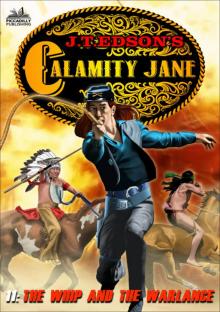 Calamity Jane 11
Calamity Jane 11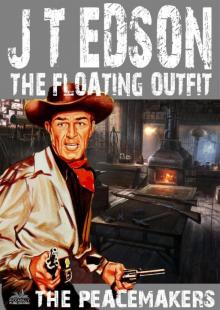 The Floating Outift 33
The Floating Outift 33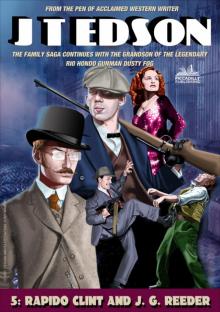 Cap Fog 5
Cap Fog 5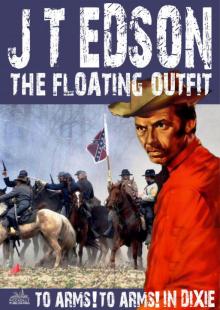 The Floating Outfit 34
The Floating Outfit 34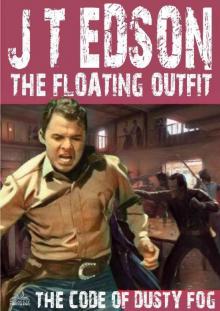 The Code of Dusty Fog
The Code of Dusty Fog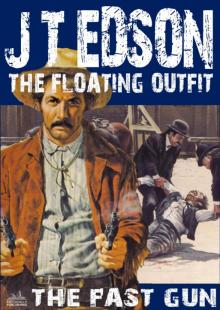 The Floating Outfit 21
The Floating Outfit 21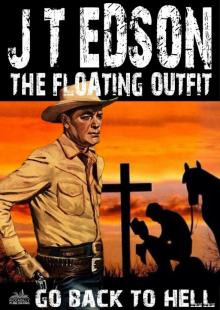 The Floating Outift 36
The Floating Outift 36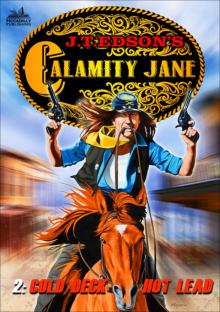 Calamity Jane 2
Calamity Jane 2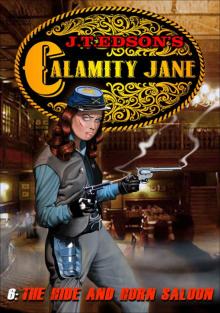 Calamity Jane 6: The Hide and Horn Saloon (A Calamity Jane Western)
Calamity Jane 6: The Hide and Horn Saloon (A Calamity Jane Western)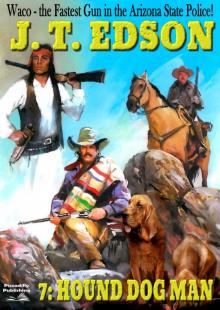 Waco 7
Waco 7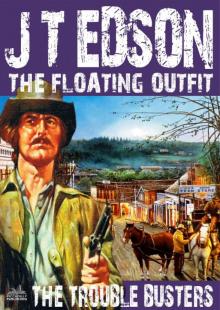 The Floating Outfit 25
The Floating Outfit 25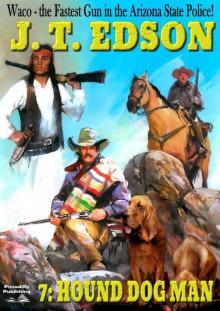 Waco 7: Hound Dog Man (A Waco Western)
Waco 7: Hound Dog Man (A Waco Western)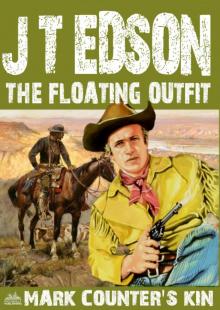 The Floating Outfit 47
The Floating Outfit 47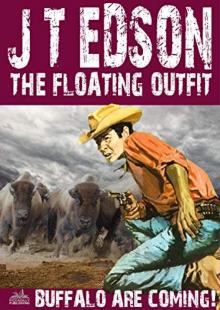 The Floating Outfit 42: Buffalo Are Coming!
The Floating Outfit 42: Buffalo Are Coming!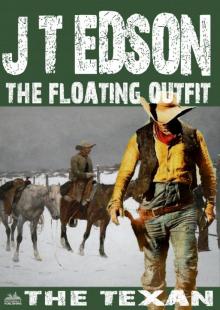 The Floating Outfit 46
The Floating Outfit 46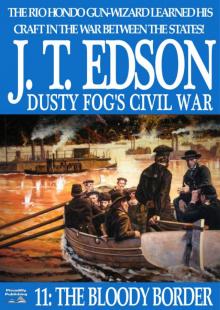 Dusty Fog's Civil War 11
Dusty Fog's Civil War 11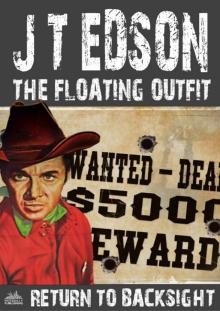 The Floating Outfit 61
The Floating Outfit 61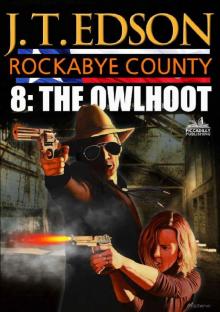 The Owlhoot
The Owlhoot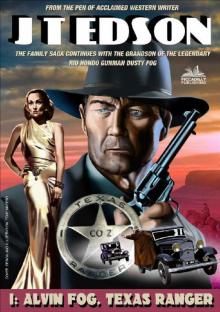 Alvin Fog, Texas Ranger
Alvin Fog, Texas Ranger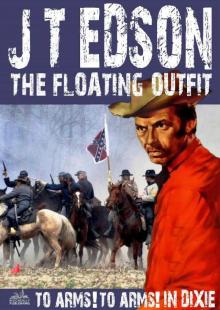 The Floating Outfit 34: To Arms! To Arms! In Dixie! (A Floating Outfit Western)
The Floating Outfit 34: To Arms! To Arms! In Dixie! (A Floating Outfit Western)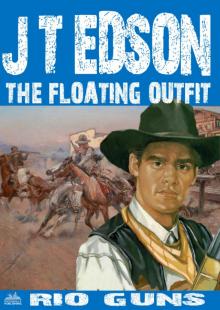 The Floating Outfit 44
The Floating Outfit 44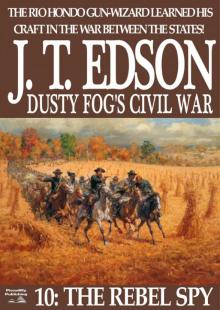 Dusty Fog's Civil War 10
Dusty Fog's Civil War 10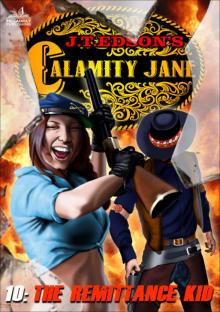 Calamity Jane 10
Calamity Jane 10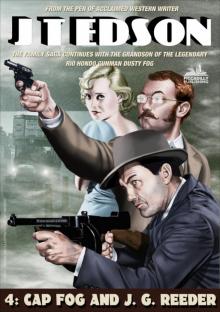 Cap Fog 4
Cap Fog 4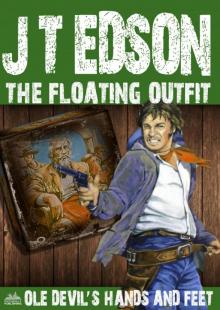 The Floating Outfit 51
The Floating Outfit 51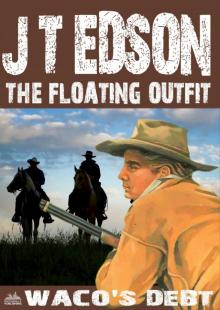 The Floating Outfit 50
The Floating Outfit 50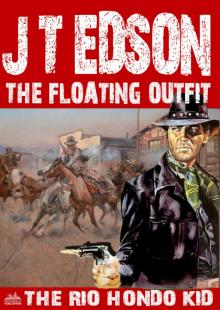 The Floating Outfit 49
The Floating Outfit 49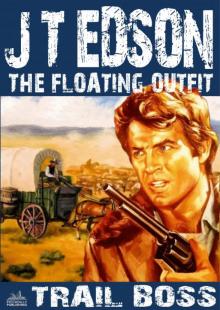 The Floating Outfit 10
The Floating Outfit 10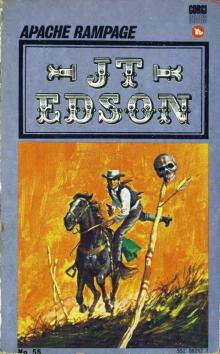 Apache Rampage
Apache Rampage The Floating Outfit 15
The Floating Outfit 15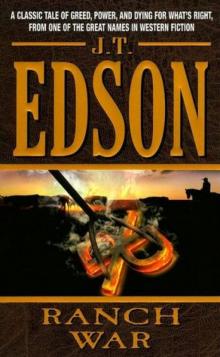 Ranch War
Ranch War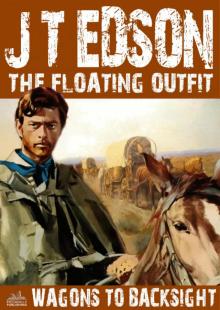 The Floating Outfit 11
The Floating Outfit 11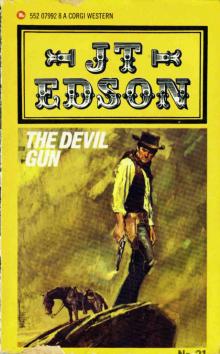 The Devil Gun
The Devil Gun Sacrifice for the Quagga God (A Bunduki Jungle Adventure Book 3)
Sacrifice for the Quagga God (A Bunduki Jungle Adventure Book 3)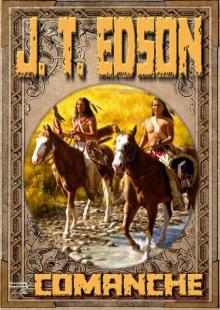 Comanche (A J.T. Edson Western Book 1)
Comanche (A J.T. Edson Western Book 1)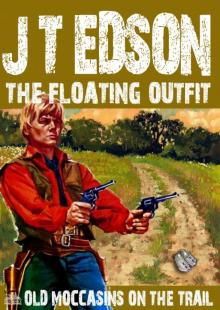 The Floating Outfit 48
The Floating Outfit 48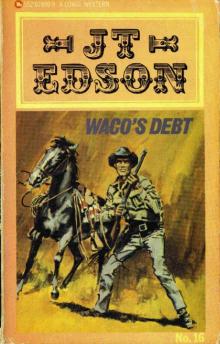 Wacos Debt
Wacos Debt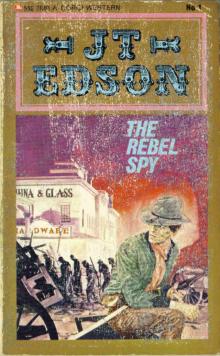 The Rebel Spy
The Rebel Spy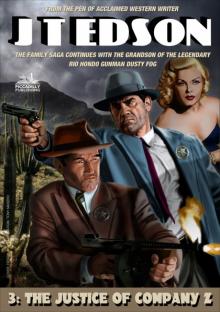 Cap Fog 3
Cap Fog 3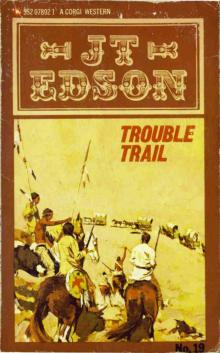 Trouble Trail
Trouble Trail Cold Deck, Hot Lead
Cold Deck, Hot Lead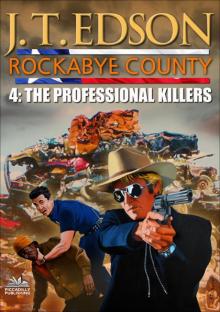 Rockabye County 4
Rockabye County 4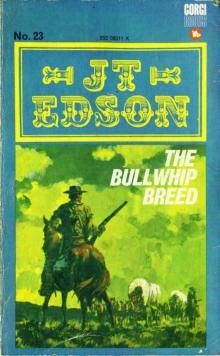 The Bullwhip Breed
The Bullwhip Breed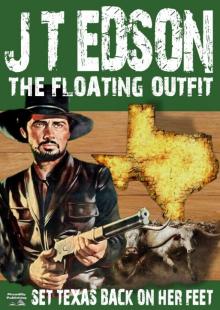 Set Texas Back On Her Feet (A Floating Outfit Western Book 6)
Set Texas Back On Her Feet (A Floating Outfit Western Book 6)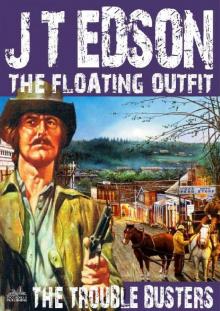 The Floating Outfit 25: The Trouble Busters (A Floating Outfit Western)
The Floating Outfit 25: The Trouble Busters (A Floating Outfit Western) Fearless Master of the Jungle (A Bunduki Jungle Adventure
Fearless Master of the Jungle (A Bunduki Jungle Adventure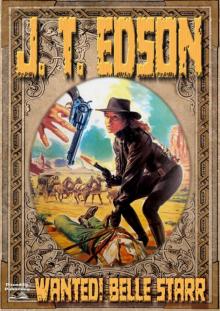 Wanted! Belle Starr!
Wanted! Belle Starr! The Big Hunt
The Big Hunt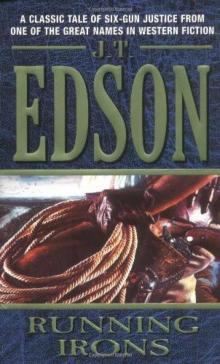 Running Irons
Running Irons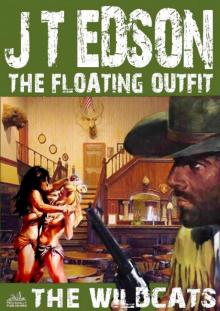 The Floating Outfit 19
The Floating Outfit 19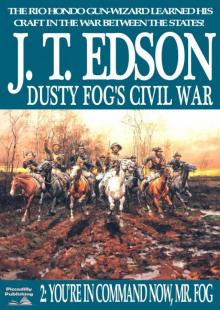 You're in Command Now, Mr Fog
You're in Command Now, Mr Fog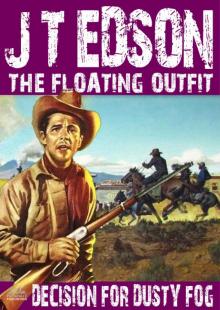 The Floating Outfit 27
The Floating Outfit 27 Texas Killers
Texas Killers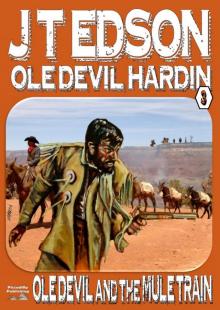 Ole Devil and the Mule Train (An Ole Devil Western Book 3)
Ole Devil and the Mule Train (An Ole Devil Western Book 3) Bunduki and Dawn (A Bunduki Jungle Adventure Book 2)
Bunduki and Dawn (A Bunduki Jungle Adventure Book 2)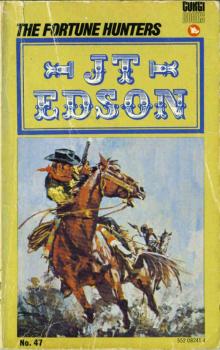 The Fortune Hunters
The Fortune Hunters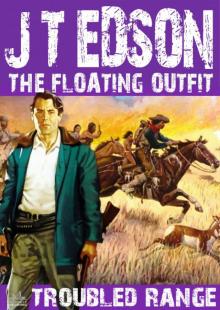 The Floating Outfit 12
The Floating Outfit 12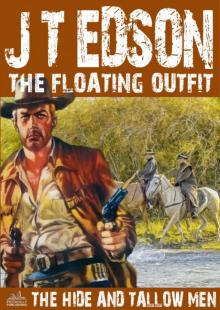 The Hide and Tallow Men (A Floating Outfit Western. Book 7)
The Hide and Tallow Men (A Floating Outfit Western. Book 7)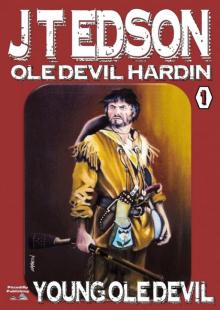 Young Ole Devil
Young Ole Devil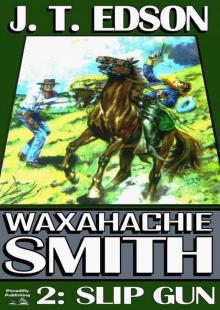 Slip Gun
Slip Gun The Drifter
The Drifter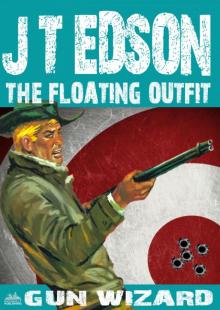 The Floating Outfit 45
The Floating Outfit 45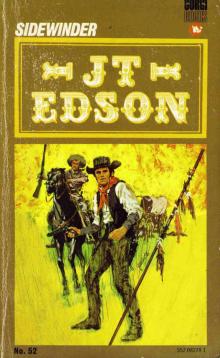 Sidewinder
Sidewinder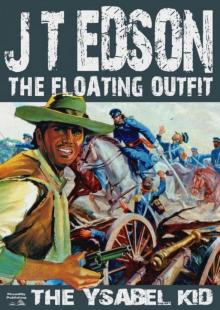 The Ysabel Kid
The Ysabel Kid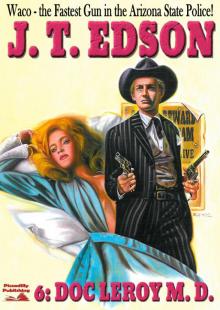 Waco 6
Waco 6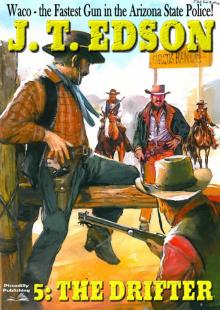 Waco 5
Waco 5 Point of Contact
Point of Contact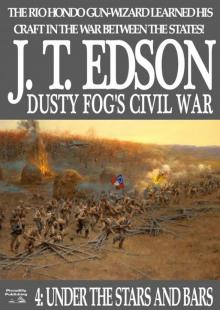 Under the Stars and Bars (A Dusty Fog Civil War Western Book 4)
Under the Stars and Bars (A Dusty Fog Civil War Western Book 4)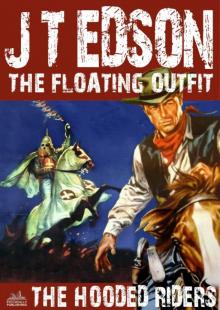 The Floating Outfit 9
The Floating Outfit 9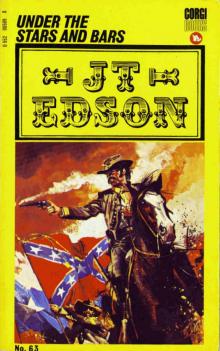 Under the Stars and Bars
Under the Stars and Bars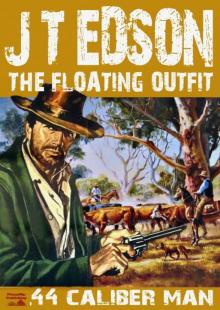 .44 Caliber Man
.44 Caliber Man The Floating Outfit 17
The Floating Outfit 17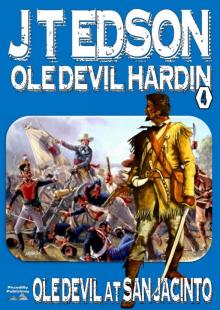 Ole Devil at San Jacinto (Old Devil Hardin Western Book 4)
Ole Devil at San Jacinto (Old Devil Hardin Western Book 4)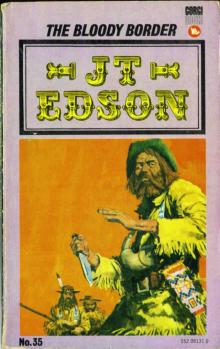 The Bloody Border
The Bloody Border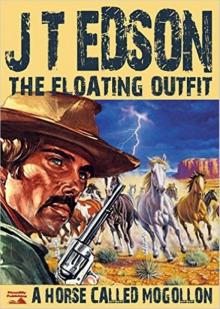 A Horse Called Mogollon (Floating Outfit Book 3)
A Horse Called Mogollon (Floating Outfit Book 3)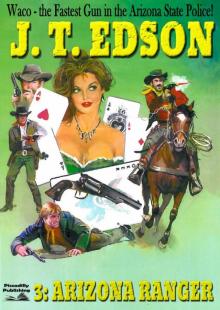 Waco 3
Waco 3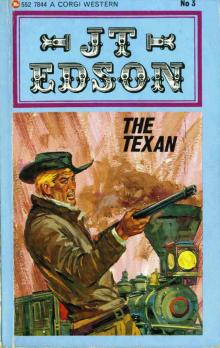 The Texan
The Texan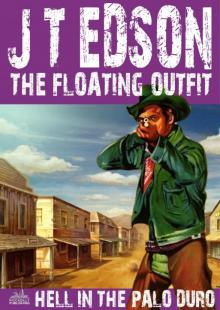 The Floating Outfit 35
The Floating Outfit 35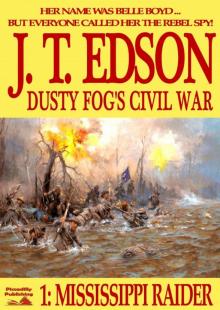 Mississippi Raider
Mississippi Raider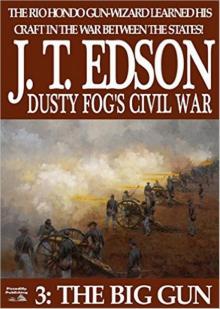 The Big Gun (Dusty Fog's Civil War Book 3)
The Big Gun (Dusty Fog's Civil War Book 3)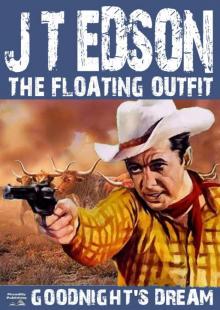 Goodnight's Dream (A Floating Outfit Western Book 4)
Goodnight's Dream (A Floating Outfit Western Book 4) Waco 4
Waco 4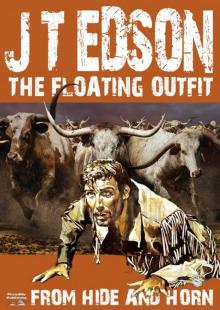 From Hide and Horn (A Floating Outfit Book Number 5)
From Hide and Horn (A Floating Outfit Book Number 5)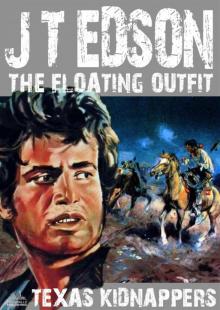 The Floating Outfit 18
The Floating Outfit 18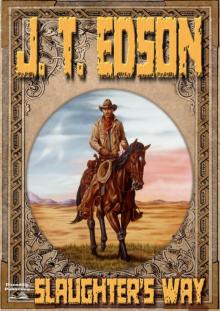 Slaughter's Way (A J.T. Edson Western)
Slaughter's Way (A J.T. Edson Western)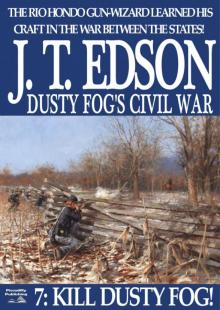 Dusty Fog's Civil War 7
Dusty Fog's Civil War 7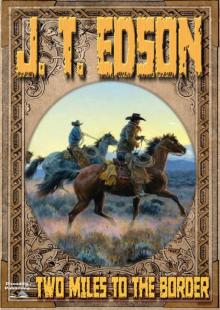 Two Miles to the Border (A J.T. Edson Western)
Two Miles to the Border (A J.T. Edson Western)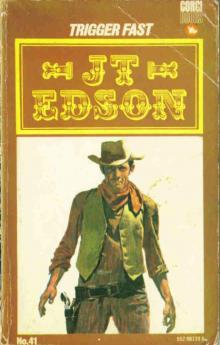 Trigger Fast
Trigger Fast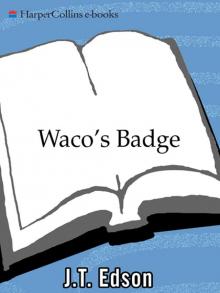 Waco's Badge
Waco's Badge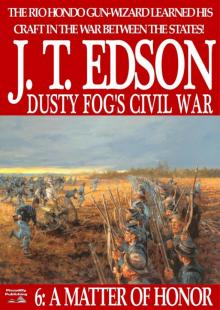 A Matter of Honor (Dusty Fog Civil War Book 6)
A Matter of Honor (Dusty Fog Civil War Book 6)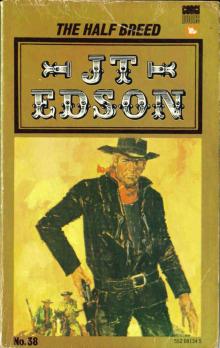 The Half Breed
The Half Breed Bunduki (Bunduki Series Book One)
Bunduki (Bunduki Series Book One)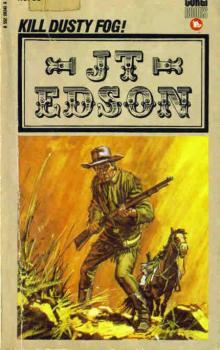 Kill Dusty Fog
Kill Dusty Fog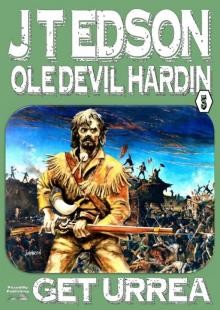 Get Urrea! (An Ole Devil Hardin Western Book 5)
Get Urrea! (An Ole Devil Hardin Western Book 5)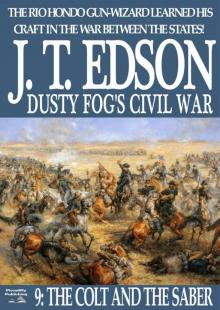 Dusty Fog's Civil War 9
Dusty Fog's Civil War 9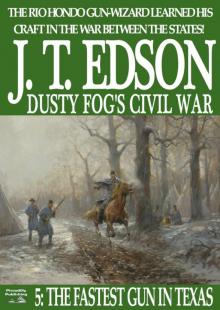 The Fastest Gun in Texas (A Dusty Fog Civil War Book 5)
The Fastest Gun in Texas (A Dusty Fog Civil War Book 5)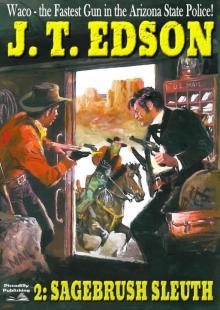 Sagebrush Sleuth (A Waco Western #2)
Sagebrush Sleuth (A Waco Western #2)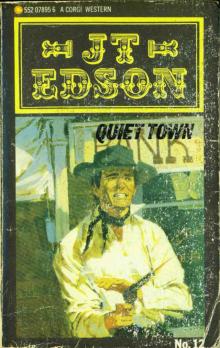 Quiet Town
Quiet Town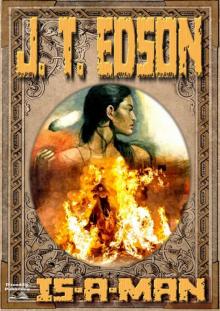 Is-A-Man (A J.T. Edson Standalone Western)
Is-A-Man (A J.T. Edson Standalone Western)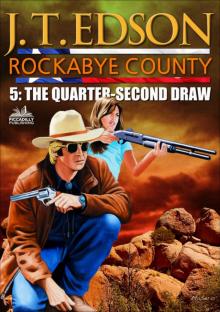 Rockabye County 5
Rockabye County 5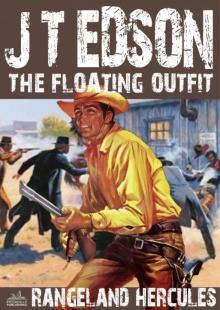 The Floating Outfit 14
The Floating Outfit 14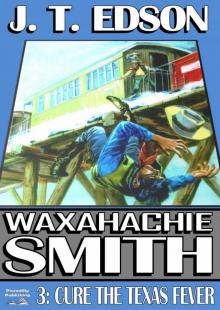 Cure the Texas Fever (A Waxahachie Smith Western--Book 3)
Cure the Texas Fever (A Waxahachie Smith Western--Book 3)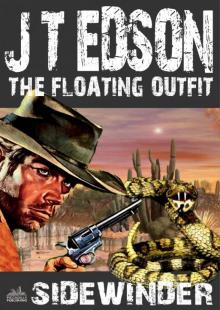 The Floating Outfit 13
The Floating Outfit 13 The Road to Ratchet Creek
The Road to Ratchet Creek